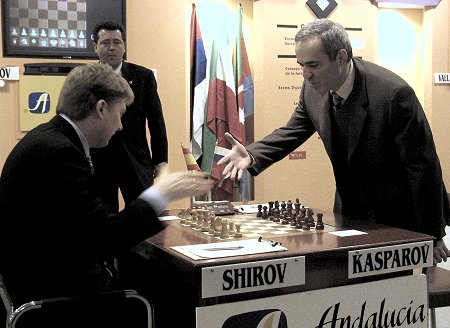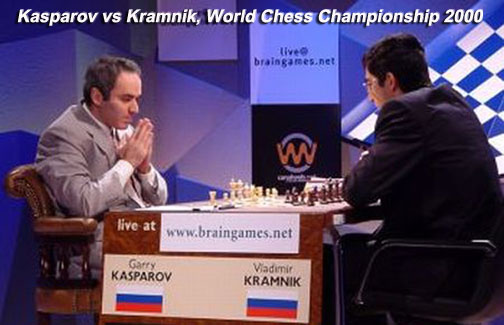After the successful defence of his title against Anand 1995, the Classical World Champion Garry Kasparov had trouble organizing his next match. Intel Corporation refused to renew its sponsorship of the PCA (Professional Chess Association) which stood behind the Kasparov – Anand match. Kasparov was unable to find a new sponsor. As a result, PCA collapsed.
In 1998, instead of determining a challenger with the help of the Interzonal Tournament and Candidates matches (as in 1993-1995 cycle), Kasparov announced that Viswanathan Anand and Vladimir Kramnik, numbers two and three in the world, would play a match which would determine Kasparov’s challenger.
However, Anand refused to play in the match due to the participation in the FIDE qualification cycle. Kasparov then simply selected the next person on the rating list, Alexei Shirov, as Kramnik’s match opponent. The match was played in Cazorla, Spain, in 1998, and despite being the underdog, Alexei Shirov won.
However, Kasparov – Shirov match never actually happened. Shirov refused one match offer from California. Later, it turned out it was hard to find a suitable sponsor; broad chess public didn’t regard Shirov as a strong contender. Most people weren’t interested in a potential Kasparov – Shirov match.
By Kasparov’s own admission:
„ […] a serious offer arrived from Los Angeles to stage the match in November with a prize fund of one million dollars – $650,000 to the winner and $350,000 to the loser. This was far better than nothing. But Shirov initially stated that he would not play for less than $400,000 in the event of defeat, and then he demanded immediate bank guarantees. My lawyer worked flat out and quickly prepared a contract, and the organizers agreed to transfer the money to a bank account in installments over a period of 30 days. But Shirov obstinately said: ‘No!’- and our match collapsed.“
(Source: Garry Kasparov On Garry Kasparov Part III: 1993-2005, page 221)

In February 1999 Kasparov finally abandoned all plans to play against Shirov altogether. Feeling obligated to defend his title, he decided to simply pick his next challenger. Once again Viswanathan Anand was his first choice, but the two couldn’t agree about the match conditions. In the end, Kasparov approached Vladimir Kramnik and asked him to play in the match. Kramnik agreed and the company BrainGames was formed to provide the money for the match.
Here is Kasparov’s reasoning of the choice of the challenger:
„ […] with Kramnik the score was equal (+3-3=17), many games had proved difficult for me, and it was clear to everyone that he was the most dangerous opponent. And I was convinced: the world champion was obliged to play against the strongest! I wanted to accept a genuinely serious challenge – that was the style of my entire life.
And I chose Kramnik.“
(Source: Garry Kasparov On Garry Kasparov Part III: 1993-2005, page 299)
And this is how Kramnik described the procedure:
“Look, it didn’t work out with Anand so we want you to play the match for the World title”. It was a shocker for me. So, we agreed to negotiate with Raymond Keene and Brain Games. Straight after the end of the tournament in Monaco Kasparov called me to say what was the situation and that he was ready to play the match and so on. That was it.“
Therefore, after long five years, the chess world had the opportunity to see the Classical World Champion in the title defence. The match was held in London, from 8 October 2000 to 4 November 2000. Kasparov was a big favourite – in the 1999 and 2000 he was dominating in tournament play and he outrated the challenger by almost 100 points. Moreover, he had more match experience, while Kramnik lost to Gelfand and Shirov in the past. Everybody expected a quick rout.
However, by employing the rock-solid Berlin Defence, Kramnik frustrated Kasparov and effectively diffused his opponent’s White pieces. At the same time, Kramnik, due to his great opening preparation, kept posing Kasparov problems with the White pieces. Already in the 2nd game, he scored a convincing victory against Kasparov’s Grünfeld. And in the 10th game, he exploited Kasparov’s blunder in the Nimzo Indian Defence by sacrificing his bishop on e6 and forcing a resignation on move 25.
In the end, with the final score of 8.5-6.5, Kramnik ended the second longest reign on the throne in the history of chess, he captured the crown and became the 14th World Champion.
The aftermath of the match was not without the controversy, though. First of all, although the majority of chess world admitted that the player who is capable of beating great Kasparov in a match very much deserves a title, devastated Alexei Shirov, who was stripped of his opportunity, claimed even in 2006 that he doesn’t consider Kramnik as a rightful champion.
Secondly, FIDE’s president, Kirsam Ilyumzhinov, maintained his attitude that FIDE officially recognizes only the official FIDE champion (Alexander Khalifman, who had won the Fide World Championship Tournament in 1999):
„In reply to written questions about the Kasparov-Kramnik match, Mr. Ilyumzhinov said of Mr. Kasparov: ”Has he played in the World Chess Championship since 1993? FIDE’s answer is no.” He added, ”We recognize Aleksandr Khalifman as the 14th world champion and as the reigning world champion.”
Finally, after the match, a heated dispute arose between the ex- and the new champion regarding the rematch clause. The match contract didn’t include one. Kasparov was eager for a rematch and many years later he explained his reasoning:
„Of course, a clause about return match should have been included in the contract, and Kramnik would not have objected. In the given instance this was a sensible idea, since the challenger had not participated in the organization of the match, he had not gathered the money for its staging, as happened in ancient times, and he was presented with all this on a silver platter (such a sinecure was unprecedented in chess history!, moreover without having to qualify – and after his win he tried to persuade everyone that I must play in a qualifier…But all my life I had spoken against return matches – and I decided not to make an exception.
For this choice, I was to pay bitterly.“
(Source: Garry Kasparov On Garry Kasparov Part III: 1993-2005, page 299)
In the end, nothing came out of it and the relationship between the players was strained. Nevertheless, many years later, Kasparov gave credit where credit was due:
„ Speaking more broadly, I can say that Kramnik arrived for our match with new ideas and he made a great contribution to the further development of chess. The opening theory, philosophical outlook on the opening and tastes of numerous players in the early 21st century were formed under the influence of this match and the 14th world champion. For a time, his approach to chess became the dominating one.
As for myself, I overestimated the role of computer analysis, I did not get the feel of my opponent, and I was unable to withstand the intensity of a battle in which much had to be devised along the way. The wound suffered in the second game proved impossible to heal. I was let down by defects in my psychological preparation and a lack of nervous energy. I did not have alongside me an experienced, top-class grandmaster, and an overall conception of the match was not devised.
In that historic autumn, fate punished me for my excessive self-confidence and lack of practicality.“
(Source: Garry Kasparov On Garry Kasparov Part III: 1993-2005, page 330)
SOURCES
Garry Kasparov On Garry Kasparov Part III: 1993-2005
New York Times: A Chess Match Is Waged For A World Title Whose Authenticity Is Challenged

